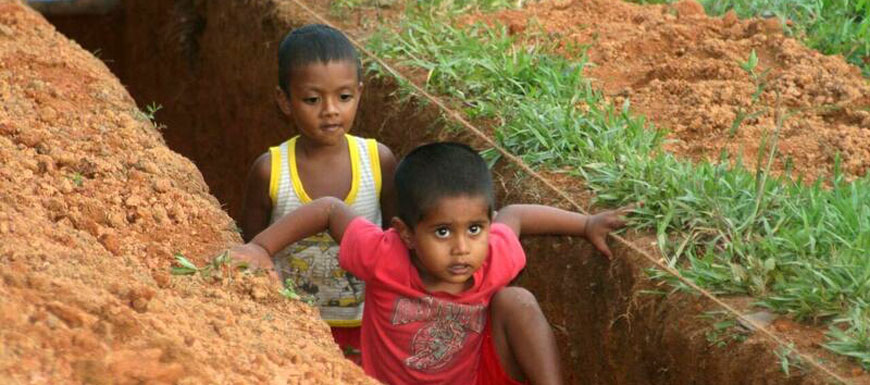2020 is officially the year of change. As we all know Sri Lanka has not been spared from the Corona pandemic, which is why we had to reset our goals for this year.
In the following report we have summarized the last months, especially the progress of our garden project for you.
At the end of March schools and kindergartens in Sri Lanka were closed down without a re‑opening in sight for a long time. The imposed curfew heavily affected us at the beginning, when nothing was clear and everyone’s knowledge was mainly based on assumptions. Some of the employees stayed at home to avoid possible fines, which are extremely high in Sri Lanka. Since our employees travel to work by bike or on foot, they had to apply for a special permit to come and look after the children. Our project manager Pavithra also received a special driving permit from the local police for the time of the curfew, so that she could travel between her home and Dedunu.
Since the number of cases in the Kalutara District, where Dedunu is located, was comparatively high, very strict regulations applied. A continuous curfew was imposed, which was only interrupted for a short period of time during the afternoon to open supermarkets, but stores otherwise remained closed and nobody was allowed to go out on the street. Due to the curfew and the closed stores, it was not possible to buy food in the beginning. Fortunately, we had prepared in advance and had a full pantry with enough rice, lentils, dried products, spices and gas for cooking. As a non-profit organization, we also received two government food packages.
The crisis is not easy for anyone, but our goal was to make the best of the situation by using the time effectively and implementing new ideas. Since school was closed, all of our children had to stay home. Due to the regulations, nobody other than our employees were allowed to enter the property, no private teacher could come to teach the children. This means that there were not many options left to continue the education of the children as usual as online teaching is not an option in Sri Lanka. The only possibility was to work through the books the children had received at the beginning of the school year. This left quite a lot of time where the boys had to be occupied. So what better thing to do, that work outside in the garden? As many people did during lockdown, our boys helped to advance our garden project. This way the governmental lockdown period had a very positive side effect for our project. In the past months, with the help of our boys, huge progress could be made in our garden.
From the very beginning the aim was to expand our self-sufficiency and thus to bring a greater variety of fruit and vegetable plants into our project. They cleared, dug, felled, chopped, shovelled, planted and sowed: everyone pitched in and so in the last few months an incredible amount of work has been done.
After our visit to the project in August 2019, the construction of a new staircase was planned as a simultaneous protection against flooding in heavy rain, which has been completed in December last year. After the basic construction work, our employees with the help of the children were able to start sowing and growing vegetables and fruit with the help of the children. Typical Sri Lankan fruit and vegetable varieties were planted. One of our older boys, who left the orphanage some time ago, now works as a vegetable farmer. In order to support the garden project, he spent 3 days at Dedunu and shared his newly gained knowledge with his brothers and the orphanage staff.
Our children were able to experience for themselves how valuable the work in their own garden can be and how wonderful it is to be able to hold their first own vegetables in their hands. They could already harvest limes, peppers, eggplants, lychees, cashew nuts, mangoes, jackfruit, bananas and many more things. This of course arises the curiosity of everyone, everyone wants to be the first, see what changes and what is happening.






















